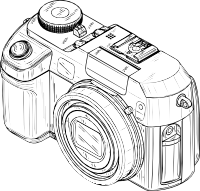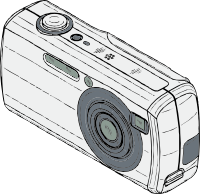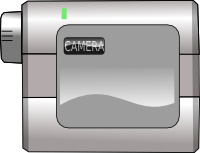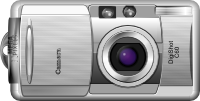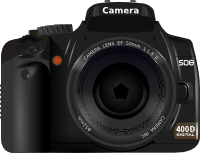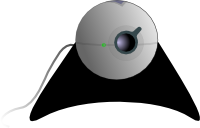Associations to the word «Camera»
Noun
- Zoom
- Lens
- Tripod
- Shutter
- Reflex
- Projector
- Olympus
- Pixel
- Microphone
- Surveillance
- Sensor
- Led
- Aperture
- Footage
- Cinematographer
- Eastman
- Scanner
- Lm
- Photography
- Adapter
- Digital
- Photographer
- Gps
- Editing
- Cinematography
- Imaging
- Spectrometer
- Binocular
- Recorder
- Negative
- Optics
- Laptop
- Angle
- Cine
- Tilt
- Finder
- Stabilization
- Setup
- Hd
- Samsung
- Telescope
- Filmmaking
- Microscope
- Canon
- Nokia
- Accessory
- Optic
- Photograph
- Filming
- Lighting
- Image
- Retina
- Calibration
- Gamma
- Monitor
- Exposure
- Framing
- Tracking
- Operator
- 3d
- Scanning
- Detector
- Foreground
- Bellow
- Posing
- Viewing
- Photo
- Dolly
- Mm
- Robotic
- Payload
- Prism
- Remote
Adjective
Pictures for the word «Camera»
Wiktionary
CAMERA, noun. A device for taking still or moving pictures or photographs.
CAMERA, noun. (video games) The viewpoint in a three-dimensional game or simulation.
CAMERA CLUB, noun. A club (social organization) devoted to photography.
CAMERA CLUBS, noun. Plural of camera club
CAMERA FLASH, noun. A device that produces a short flash of light to help illuminate a scene, mostly for night-time or indoors photography.
CAMERA LEFT, noun. On the left side of the stage when viewed from the audience facing the stage, stage right.
CAMERA LUCIDA, noun. An instrument that uses a shaped prism or mirrors to cause an apparent image of external objects to appear as if projected upon a plane surface, so that the outlines may be conveniently traced.
CAMERA LUCIDAS, noun. Plural of camera lucida
CAMERA MOVE, noun. (film) (television) A specific deliberate movement effected by the camera, such as a pan, zoom, tilt etc.
CAMERA OBSCURA, noun. A darkened chamber in which the image of an outside object is projected and focused onto a surface
CAMERA PHONE, noun. A cellular phone that has a built-in camera.
CAMERA PHONES, noun. Plural of camera phone
CAMERA READY, adjective. Art or "hard copy" (a document or graphic art) that requires no additional work to be done to it before copies of it can be reproduced. It is commonly used in situations where separate documents will be compiled into a single compilation, such as compiling technical publications into a conference handout.
CAMERA RIGHT, noun. On the right side of the stage when viewed from the audience facing the stage, stage left.
Dictionary definition
CAMERA, noun. Equipment for taking photographs (usually consisting of a lightproof box with a lens at one end and light-sensitive film at the other).
CAMERA, noun. Television equipment consisting of a lens system that focuses an image on a photosensitive mosaic that is scanned by an electron beam.
Wise words
Every day we should hear at least one little song, read one
good poem, see one exquisite picture, and, if possible,
speak a few sensible words.

